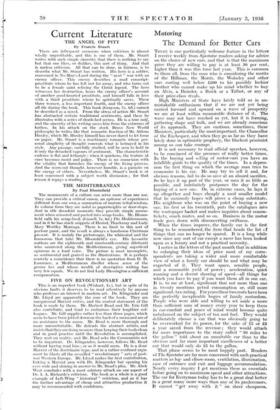THE ANGEL OF PITY
Current Literature
By Francis Stuart
There are infrequent occasions when criticism is almost wholly unprofitable, and this is one of them. Mr. Stuart writes with such simple sincerity that there is nothing•to say but that one likes, or dislikes, this sort of thing. And that is useless criticism. All that can be done, in fairness, is to describe what Mr. Stuart has written. His hero is a soldier, marooned in No-Man's-Land during the " next " war with an enemy officer. This enemy describes a mad conscript- prostitute whom he has left not far away, and who turns out to be a female saint reliving the Christ legend. The hero witnesses her destruction, hears the enemy officer's account of another good-hearted prostitute, and himself falls in love with a third prostitute whom he spiritually saves. These three women, a less important fourth, and the enemy officer all die during the book. This book (Grayson, 7s. 6d.) cannot be described as a novel. From the stress of action Mr. Stuart has abstracted certain traditional sentiments,. and these he illustrates with a series of death-bed scenes. He is a true natf, and the sincerity of his writing saves him from the extremes of bathos. In his attack on the stock Brave New World philosophy he writes like that romantic fraction of Mr. Aldous Huxley, which Mr. Huxley himself has never dared to let loose on paper. Mr. Stuart is a reactionary romantic whose per- sonal simplicity of thought conceals what is betrayed in his style. Any passage, carefully studied, will be seen to hold in it only the detached vapours of sentiment. The characteristic cadence is flat and lethargic ; when it quickens, the texture at once becomes moist and pulpy. There is no connexion with the vitality that furnishes the energy of the living process. And the worn-out thought, however humble, is a parasite on the energy of others. Nevertheless, Mr. Stuart's book is at least concerned with a subject worth discussion ; for that reason it repays a reading.










































 Previous page
Previous page